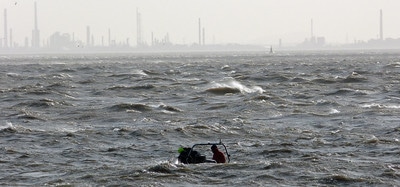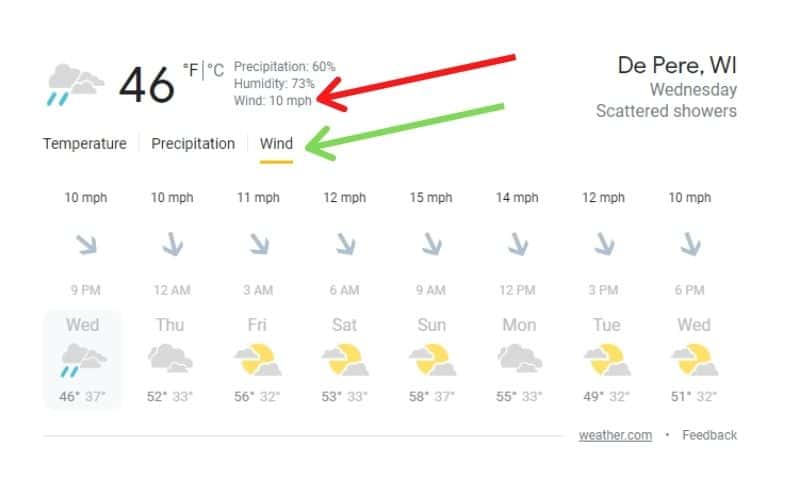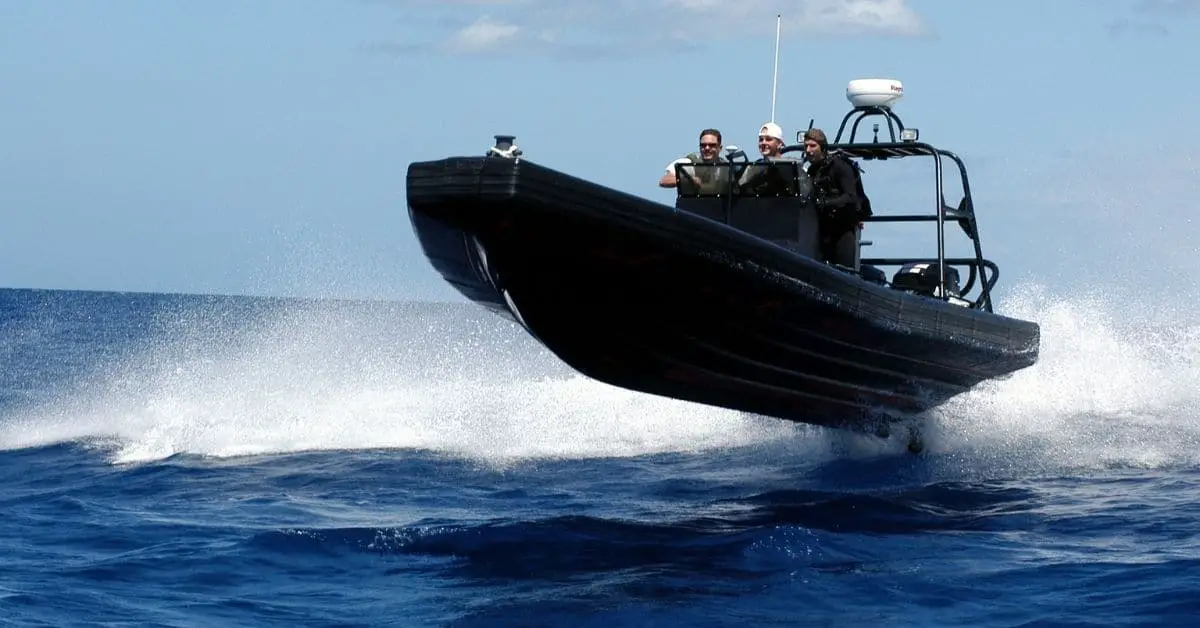Wind will always be a major factor in how well your time on the water will be. No matter the size of the boat, it’s important to check wind and wave forecasts before you go boating. You don’t want to end up like this dude:

So, how windy is too windy for boating? The answer obviously depends on the size of your boat and the size of the waves but in general, wind speeds over 20 knots (23 mph) are too windy for boating. At this wind speed, almost all size boats will be greatly affected, and smaller boats may even be in danger of capsizing.
This number is not the same for every body of water as some bodies of water will create larger waves than others. Generally, larger bodies of water will create larger waves. So during windy times, larger bodies of water such as oceans will be less safe than small bodies of water such as lakes for boating.
Especially places such as the Pacific ocean, which is known for having very large waves even on days where it isn’t even that windy. So 20-knot winds might make it just that much worst.
Although, if you do boat in these places, you probably have a larger boat to accommodate the larger waves.
When does wind truly become dangerous for boaters?
Wind and waves both come in to play when we’re talking about dangers for boaters, but most boats can still go out even in 20 knots (23mph) winds. It will just be very wavy and hard to dock, which means most boaters will decide not to go out on days that windy.
Once the wind starts to get in the 34 knots (39 mph) range, then it starts to become a real danger to boaters. According to weather.gov, 34 knots is enough to capsize small boats and trust me, even if you have a big boat, you don’t want to be on the water.
How to check wind forecasts
Checking wind forecasts is as easy as looking up “weather forecasts” in Google and boom they give you the wind speed (red arrow). If you click on the wind option as you can see by what the green arrow is pointing to, you can get some more valuable information about the wind.

On mobile, it will look like this:

If you want to know more such as wave height and wind gusts, look up your location, then wave report in Google. For example, “Manitowoc wave report”. These will be the most accurate, but if you can’t find a good report for your area, check out this website here and enter your location.
The effects of wind on different kinds of boats
Some boats handle the wind much better than others do. Boats that have very high hulls and/or big flybridges, will be affected by the wind a lot more than boats that don’t. This is because all the surface area on these boats will almost act as a sail which will catch a lot of the wind causing the boat to move accordingly.
When dealing with these kinds of boats in the wind, you need to make sure you know what you’re doing. Wind can easily cause crashes, especially in the marina where there is limited space.
But smaller boats will also be worst in rough water. Bass boats are a great example of a boat that barely gets affected by the wind due to their small surface area but doesn’t do well in rough water. This is why bass boats are so good for small Lakes, where the waves never get big even when the wind is very strong.
What’s the best boat to handle windy conditions
The best boat for handling high winds is a bass boat due to the small surface area, but this is only for small bodies of water where waves aren’t much of a factor. When it comes to bigger bodies of water, muscle boats will handle well if they are big enough to take on large waves.
Boats that aren’t very good in windy conditions include pontoon boats, flybridge boats, flat hull boats, and lightweight deep V’s. All these boats have a large surface area for their weight, causing them to be vulnerable to the wind.
A smaller surface area makes wind less of a factor because there is less area on your boat for it to affect. You also need to keep in mind wave size obviously because smaller boats won’t do as well in large waves.
How to boat in windy conditions
Boating in windy rough seas can be a challenge, especially for those who haven’t done it before. If the waves get too big, you might have to apply a couple of these strategies I explain below.
When boating down sea (with the waves)
The number one rule when boating down sea is to always set your trim so that the bow is as high up as it can. You don’t want to get over a wave and then submarine your boat when going down it.
If it is extremely wavy, do not surf the waves. This will also cause your nose to face downward making submarining very likely. Instead, stay in the back of the wave and ride it that way.
When going up sea
When traveling up sea, and the waves are very compact, try going very fast to glide above the waves. Also, if your bow is moving a lot, pull your trim down a little bit to help straighten it out. But the waves aren’t always like this, so sometimes you have to take a different approach.
If the waves are very spread out, you need to slow down a little bit after every wave. Then when you reach the next wave, speed up once you get on top of it.
When going sideways to the sea
Ideally, you don’t want to be traveling sideways to the sea, but if you do, try to travel in a trough of a wave. A trough is the bottom part of the wave, and when traveling side sea, you can pick out lines of this where you can travel without having waves hit the side of your boat.
Docking
Docking in windy and wavy conditions is a pain unless you have side thrusters or spinning propellers. If not, you will need to use the wind to your advantage by pushing you into a docking position.
For example, if the wind is going left to right, you need to aim your boat towards the left of your dock slot. Get closer, and let the wind push you to the right until you can accelerate forward into the slot.
If you have a larger boat, and you’re trying to dock in a large marina, you may need to use some strategies that are explained in the video below:
- What Is The Cheapest Way To Store A Boat? - February 28, 2023
- Do Boats Need Bottom Paint? (Uncovering the Truth) - February 2, 2023
- How Much Is Bass Boat Insurance? (Real Quotes) - January 18, 2023

